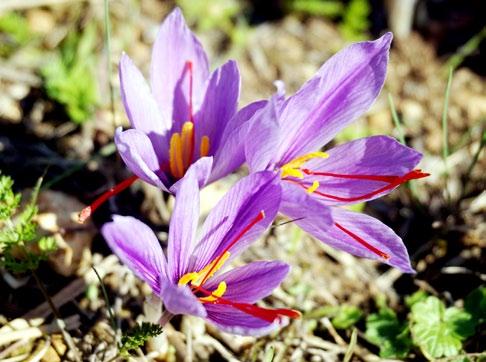
15 minute read
Little pinch of luxury
from 2020-06 Sydney
by Indian Link
How a NSW farm is growing Indian cuisine’s favourite spice, saffron
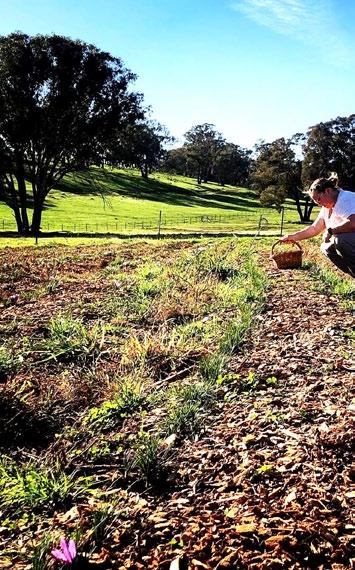
BY SHANIA O’BRIEN
Angela and Brendon Argyle have just come out of four weeks of harvesting at their Orange farm. Picking all day from six in the morning to late afternoon, they are thrilled with their output this year - some 300 gms of produce.
It came from 60,000 flowers - all carefully handpicked, stripped and dried.
The Argyles are saffron farmers, their company Argyle Australian Saffron one of a small number of saffron producers in this country.
Saffron (Crocus sativus) is the most expensive spice on the planet. It comes from the thin, long, crimson-coloured stigma of the purple-hued flower of the low-growing saffron plant. (In the company logo, the ‘y’ in ‘Argyle’ is a y-shaped thread of saffron).
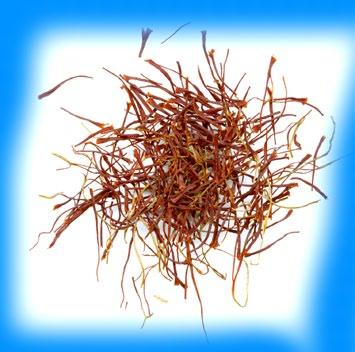
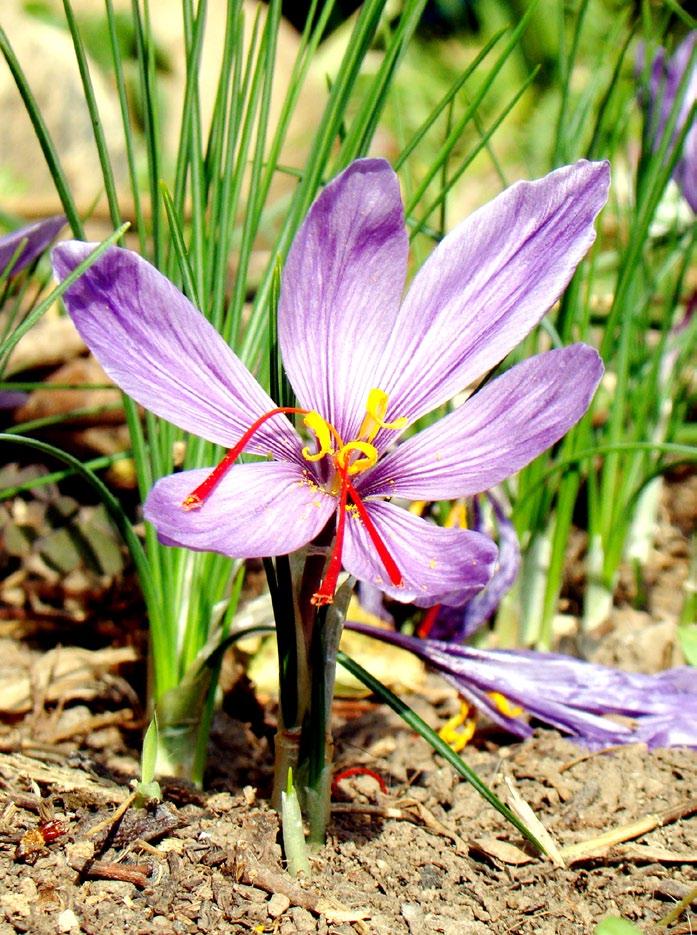
“We pick the flowers just as they start to open,” Angela Argyle describes. “We don’t want them to be in the sun for too long. Around 240 flower stigmas make up our signature one-gram jar of premium saffron. It is potent enough to flavour at least fifteen family-sized dishes.”
It is as they say: no matter how subtly you attempt to use it, the alluring scent of saffron always shines through. Not only for flavour, saffron is also known for its healing quality. Finally, India cuisine’s cherished kesar has made its way Down Under.
The bushfires early on notwithstanding, it’s been ‘perfect saffron weather’ this year, Angela reveals – a bit of rain, cold nights and sunshiny mornings. The flowers have been plump, including in many cases, “5-stigma beauties”.
And even though all the flowers have been picked for this season, Angela is still out in the paddock early mornings in the one-degree frost.
“We are now tending the plants daily by weeding and watering so that the corms can grow and multiply under the soil,” she says, caressing the leaves. “Many people have asked to buy the corms (the rounded underground plant stem) so they can grow their own saffron. These will be available in November. We’ll spend the months keeping the mounds healthy.”
Now in their fifth year, having survived the bushfires, they were looking forward for the first time to have pickers to help them. When the pandemic meant that the usual help of travellers and backpackers was no longer available, the Argyles picked the whole crop themselves.
“The process includes individually plucking all the flowers by hand before the sun comes up, carefully drying them, and then extracting the stigma. The process can take up to six weeks to complete, as there were over fifty thousand corms underground. Corms also have to be dug up and replanted every four years because they multiply themselves.”
Angela and Brendon first started growing saffron in 2017, after leaving their corporate jobs in Sydney to move to Orange in regional NSW.
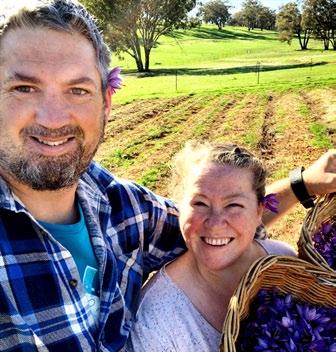
“We purchased five thousand corms of saffron to test the soil and environment, with each corm costing approximately $1.20 to $1.50,” Angela tells Indian Link.
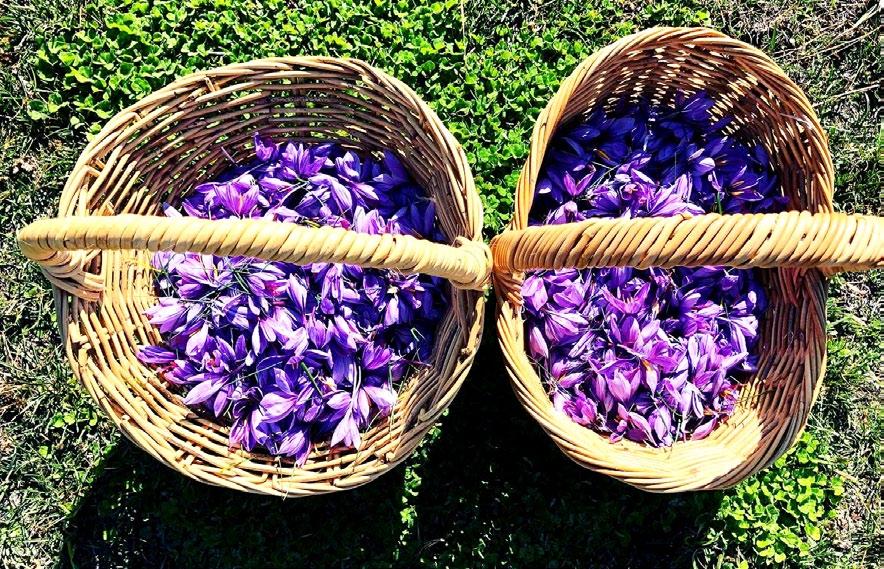
“The saffron market in Australia boomed quickly after, with more Australians looking for something unique and unusual to cook with.”
Orange is the perfect place to grow saffron, Angela says, because of its cold winters, hot, dry summers, and free draining soil. (Little did they know growing kesar in a city named Orange was clever wordplay on India’s beloved spice!)
Very soon, the Argyles invested in almost thirty thousand corms of saffron to plant and grow. From a commercial point of view, Argyle calls saffron ‘the perfect spice.’ If stored in a cool, dark cabin in air-tight containers, it will last indefinitely; hence it won’t go stale if it doesn’t sell immediately.
“The domestic market for the spice has boomed in the aftermath of the pandemic and social isolation,” Angela reveals. “Now, people are looking for new recipes to try more than ever. They are experimenting with their food and demanding more Australian products.”
One of the largest pre-COVID-19 challenges was that imported saffron from European countries was much cheaper because of cheaper labour available – and because the saffron was unregulated. “It’s possible that the product was tarnished, or simply a facsimile. But now Australians are demanding local, safe products that have not been imported. Customers want products from producers they know and trust, high quality saffron that has been grown in places they recognise.”
Angela Argyle makes an argument for Australian saffron to be amongst the best in the world, despite it being a relatively new product. Tasmania is the biggest producer though, producing and selling several kilograms of saffron a year. The Argyle farm is already close to selling out the 300 grams it produced this year.
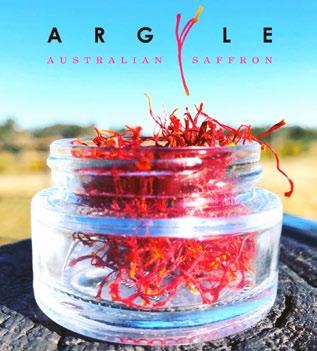
Well-known as the ‘prima donna’ of the spices - just a pinch of saffron is required to completely elevate a dish. As a dried ingredient, it needs water (or warm milk) to draw out its aromatics. It is used for both food colouring and flavouring in our own cuisine, elevating our desserts as well as elite meat and rice preparations. Across the world, it finds use in risottos, paellas, teas and cakes (and frequently in medication for women’s ailments and in beauty products like facial serums).
The Argyles themselves use it multiple times a week in different recipes, putting it in cheesecakes, cookies, Turkish delight, crème brulees, apple crumble, ice cream, lamingtons, scrolls, scones, bagels, pumpkin mash, and once, even in a saag dish.
Angela commends it for its health benefits and excellent taste, explaining that her children too love the taste of the spice. It comes as no surprise, that one of her daughters is named ‘Saffron’.
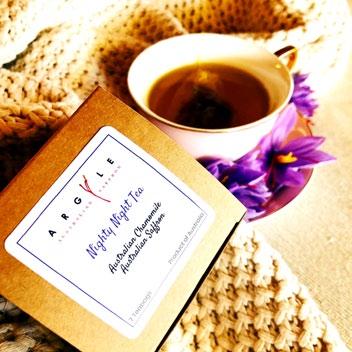
With Rajni Anand Luthra and Rhea L Nath
Uttarakhand to produce Merino wool
India’s mountainous state of Uttarakhand will soon spin out high-quality Australian sheep wool, to cater to India’s textile industry which so far has relied heavily on the global market.
A recent test report of the new wool quality compiled by the state’s animal husbandry department corroborated that its quality is similar to what is sourced from the famed Merino sheep in Australia.
“We imported Australian Merino sheep last year and the purebred yielded the same quality and this month the quantity of wool in Uttarakhand as in Australia,” Dr R Meenakshi Sundaram, Secretary of the state’s Animal Husbandry Department, said recently.
The average fibre diameter is a very impressive 16.88 microns, which is the most sought after by the textile industry across the world, Sundaram added.
Under the national livestock scheme last year, over 250 Merino sheep valued at Rs 8.5 crore (nearly A$ 1.7 million), are housed at the Government Sheep Breeding Farm in Ghansali, Tehri (Garhwal district) for breeding and improving the quality of wool.
The importance of the development can be implied from the data that the Indian textile industry imports 8000 MT – valued over Rs 2,000 crore – of fine wool from the global market, including Australia. “With very focused breeding programs for the next seven years in Uttarakhand by linking it with the integrated livelihood projects, we can produce almost 50 % of the total requirement of the textile industry in India,” said Sundaram.
At the sheep farm, high-quality germ plasm has been made available to the breeders through the use of modern artificial insemination in sheep and embryo transfer technology. The state government is aiming to offer sheep farming as a sustainable livelihood opportunity to the migrant population which has returned to Uttarakhand due to the COVID-19 outbreak.
Back in early 2019, the Indian government had approved funds under the National Livestock Mission, to three states –Uttarakhand, Himachal Pradesh and Jammu & Kashmir – for transporting the Merino breed of sheep from Australia.
In April 2019, 40 male and 200 female sheep formed the first consignment out of Australia. They were quarantined at both ends of their journey.
The high-quality Australian breed of sheep will be used for pure line and cross-breeding programmes under a well laid out breeding plan spread over five years. The sheep will be reared in the farm for two generations. From the third generation on, they will be given to farmers with a clause that the pure blood breeding should not exceed 75% of the population.
The State government aims to increase high quality wool productivity from the current 558 metric tonnes to over 1,000 metric tonnes. It will also help people in mountainous regions of the state to continue to stay in their villages and engage in sheep breeding as a sustainable economic activity.
Dubai NRI sponsors ‘gharwapasi’ flights for stranded Indians
With many Indian migrants stranded abroad during the pandemic, one Dubai-based NRI has taken steps to send them back to their motherland. Known as UAE’s ‘Masala King’, Dhananjay M. Datar has rushed to the aid of thousands of desperate Indians queuing up outside the Indian Consulate, hoping for a ticket back home.
For many, India is now virtually the last resort as they have been thrown out of their rented homes and even forced to spend nights on the roads, some having lost their jobs and been rendered practically penniless.
“There are many pregnant women, children, tourists and others on short-term visas who have been stranded here. So far, I have organized travel for over 3,000 people to Kerala, Chennai, Delhi, Hyderabad, Jaipur, Lucknow, Goa, Chandigarh,” the 56-year-old businessman confirmed.
The head of the reputed Al-Adil Trading LLC Group in the UAE has sponsored the tickets of over 1,000 Indians so far, while the others had booked in advance or possessed return tickets which came in handy.
As around 60,000 of these travellers were from Mumbai and Maharashtra, Datar reached out to Chief Minister Uddhav
Thackeray. The CM responded promptly by writing to the Centre to permit the emergency evacuation. Datar hopes, with Thackeray’s personal intervention, that flights to Mumbai will be permitted soon under the Vande Bharat Mission.
All those in dire need of repatriation are screened, undergo a mandatory Covid-19 test borne by Al-Adil Group, and complete all other formalities before they are cleared for flights, he said.
This is where Indian Consul-General Vipul extended a helping hand to send home his blue and white-collared countrymen.
“We have already sent a dozen flights to India, repatriating over 3,000 people. The efforts of Datar come as a breath of fresh air in these times of masked existence. Support by way of Al-Adil Group sponsoring air tickets and conducting free Covid-19 tests is welcome,” said diplomat Vipul.
Before boarding a flight, one Indian was in tears: “I lost my job and got no pay for two months… I had no money for the air ticket, but now I am returning home.”
Another Indian and his 32-weeks pregnant wife were among the most desperate to return as she could deliver anytime and he wanted the child to be born in India, and he was luckily selected.
However, the award-winning entrepreneur Datar rests easy on the laurels he is earning for his humanitarian services.
Dubai’s Masala King & Al-Adil Trading LLC Group head Dhananjay M. Datar gives tickets to a stranded Indian couple.
“As a fellow Indian, concerned with the plight of those stranded here, I am simply doing my duty, along with the Indian Consulate and Air India. Many have run out of resources, so we are trying to ensure they return home as early as possible,” Datar said.
With nearly 16 daily flights from the UAE, Datar describes the Kerala government as “very aggressive” to bring back Keralites. In the UAE, nearly 65 percent of the workforce is Indian and 90 per cent businesses are owned or run by Indians.
The Al-Adil Group is the leading manufacturer and distributor of Indian foods and non-food items, with 34 outlets selling the ‘Peacock’ brand in the Arab world and India.
Escalators are marked for social distancing at a mall in New Delhi as India prepares to reopen.

Restaurants, shopping malls and places of worship are now open in most states after a two-month lockdown, even as the country continues to witness a worrying rise in new coronavirus infections.
The entrepreneur, who rose from humble beginnings, ranks among the richest Indian NRIs, and helps Indian farmers by eliminating middlemen in procuring his requirements to ensure a best deal for them.
Javed Akhtar becomes first Indian to win Richard Dawkins Award
Poet, lyricist and writer Javed Akhtar has become the first Indian to win the prestigious Richard Dawkins Award for advancing human progress and humanist values, critical thinking, and proclaiming the values of secularism. Previous recipients include English-American philosopher and writer Christopher Hitchens, American comedian-political commentator Bill Maher, and English comedian Ricky Gervais.
According to the Centre for Inquiry (CFI), Akhtar was presented the award as a “distinguished individual from the worlds of science, scholarship, education, or entertainment, who publicly proclaims the values of secularism and rationalism, upholding scientific truth wherever it may lead.” The award has been presented since 2003, named after evolutionary biologist Richard Dawkins.
Akhtar has been known for his strong views on politics, art, culture, and religion in India, often drawing fierce criticism on social media for his opinions on religious fundamentalism. The 75-year-old writer believes this win will convey to Indians that they should continue to speak their mind, regardless of disapproval.
“This win will tell the world that there are people in India who express views which are sometimes not popular. Democracy has given us a gift, and we will always protect it,” he said.
His wife, veteran actor Shabana Azmi, noted that Dawkins is a hero for Akhtar, making the award even more special.
“I know what a hero Richard Dawkins has been for Javed. The award gains all the more significance because in today’s time when secularism is being attacked by religious fundamentalists of all hues, this award comes as a validation of Javed’s long service to rational thinking,” Azmi said.
Bollywood stars like Anil Kapoor and Dia Mirza took to Twitter to congratulate the lyricist on this proud moment for the country.
“Knowing that Richard Dawkins has been your hero since you read ‘The Selfish Gene’, the prestigious Richard Dawkins Award must be extra special for you! It’s a truly incredible honour! Congratulations!” Kapoor tweeted.
Facebook, Instagram unblock #sikh on platforms after three months
After their teams inaccurately blocked the hashtag in March, Facebook and Instagram have now unblocked #sikh from their platforms after three months.
Instagram’s PR team put out on a statement acknowledging the mistake.
“This is an incredibly important, painful time for the Sikh community. We designed hashtags to allow people to come together and share with one another. It's never our intention to silence the voices of this community, we are taking the necessary steps so this doesn't happen again,” Instagram said on their Twitter handle.
They added that they only became aware of the blocked hashtag in June following feedback from the community and apologised for the mistake.
Twitter users demanded more explanations as to why the hashtag was blocked in the first place, with related hashtags like #sikhism restricted as well.
“We won't be censored. The fact that this happened in the first place says a lot about Facebook and Instagram. #sikh,” said one user.
“There needs to be a follow up to this tweet. It is incredibly important that there is an explanation to this,” demanded another user.
According to a report in technology blog Engadget, this is the second time in a week that Instagram has acknowledged mistakenly preventing users from tagging a specific hashtag. Earlier, some users reported that they could not post or interact with the #blacklivesmatter hashtag.
The company said it was able to address the issue, and “reduce” the number of users who could not message using the hashtag, said the report.
Google pulls down Indian app that ‘removes Chinese apps’
Developed by an Indian start-up, a new app called ‘Remove China Apps’ has been removed from the Play Store for violating its ‘Deceptive Behavior Policy’. The app crossed 5 million downloads in May and gained popularity amid growing anti-China sentiment.
According to Sameer Samat, Vice President of Android and Google Play, they suspended the app for violating the policy of apps encouraging or incentivising users into “removing or disabling third-party apps or modifying device settings or features unless it is part of a verifiable security service".
“This is a longstanding rule designed to ensure a healthy, competitive environment where developers can succeed based upon design and innovation. When apps are allowed to specifically target other apps, it can lead to behaviour that we believe is not in the best interest of our community of developers and consumers,”Samat said.
‘Remove China Apps’ ranked #1 in India’s Android store for two days prior to its removal. In Australia, it had risen to #5 among Android apps. It was intended to scan phones for apps of Chinese origin and display a list to its users for uninstallation.
The app claimed to utilise market research to identify an app’s country of origin. It also collected ser information such as device model, language settings, and app-specific information. Some popular apps flagged by ‘Remove China Apps’ included social media platform TikTok, games like PUBG Mobile and Clash of Kings, and online shopping app Shein.
With growing tension between India and China over Himalayan border disputes, many Indian celebrities backed the idea of deleting Chinese apps. At the time, BJP spokeswoman Nupur Sharma said it was “great to see concerned citizens setting an example.”
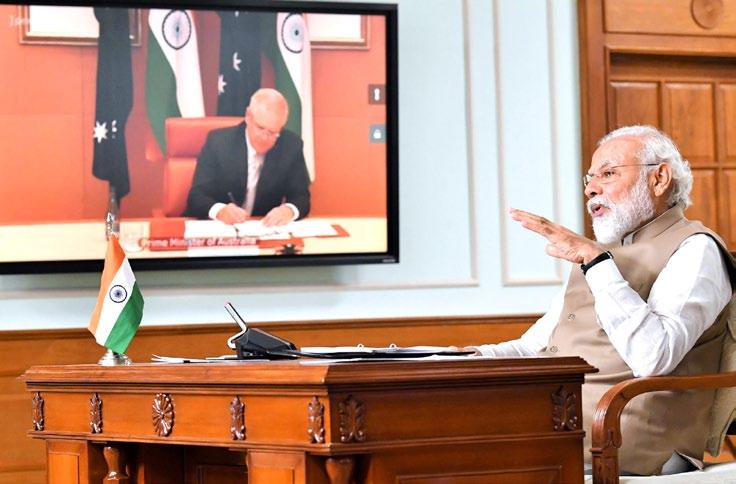
Hotel chain Taj tops list of India’s strongest brands
In a new report by the world’s leading independent brand valuation consultancy, Indian Hotels’ iconic brand Taj has topped the list of India’s strongest brands across all sectors. Brand Finance’s annual report values the brands of thousands of companies on a variety of factors like sustainability, margins, marketing investment, and familiarity.
The recognition comes on the back of Indian Hotels’ ‘Aspiration 2022’ of becoming South Asia’s most iconic and profitable hospitality company.
“Our unique service philosophy, which we refer to as ‘Tajness’, emanates from the warmth and caring Taj has stood for over a century. We remain confident of being able to carry the trust of our guests, employees and all our stakeholders with an even stronger commitment,” said Puneet Chhatwal, MD & CEO of Indian Hotels Company.
As per the 2020 report, Indian Hotels’ parent company, the Tata Group, have broken the $20 billion brand value mark for the first time despite the coronavirus pandemic’s severe economic consequences globally.
“The sheer size and diversity of Tata Group could mean that it emerges from the COVID-19 pandemic, relatively speaking, unscathed. Despite citing considerable difficulties in the current climate and warnings of a significant downturn in profits for some of its businesses – namely, Tata Steel and Tata Motors – the Group will hope that the stability and strength of the TCS and Tata Consumer Products Ltd brands will offset any damage to other arms of the Group,” commented Savio D’Souza, Director of Brand Finance.
Other big names in the list of India’s top 10 brands were LIC, Reliance, Infosys, State Bank of India, HDFC Bank, Mahindra Group, Indian Oil, HCL, and Airtel respectively.
Indian priests wary of sanitisers due to its alcohol content
Indian priests in Uttar Pradesh are unhappy with the government’s insistence on using alcohol-based sanitisers in temple premises. Shrines such as Iskcon, MukutMukharvind, and Shri Rang Nath Ji, have decided not to open their doors to the public due to the government's directions for mandatory use of alcohol-based sanitisers.
“The temple committee has decided not to open the temple for public as we will not use alcohol-based sanitizers on the premises, which is mandatory as per guidelines. Alcohol is prohibited in the temple and we cannot allow alcohol-based sanitizers. However, we have put up LED screens that will allow darshan for the devotees,” explained Ganesh Pehalwan of the MukutMukharvind temple. Instead, temples say they would prefer hand washing basins with soaps to maintain hygiene.
Meanwhile, Mathura District Magistrate Sarvagya Ram Mishra held a meeting with managements of several temples and apprised them about the recent guidelines prepared by state government for reopening of religious places across the state. He also informed that all steps would be taken for effective crowd management.
As per government guidelines, six-feet distance and wearing masks is mandatory. Additional rules include no offerings, no touching idols or books, and removing footwear in visitor’s cars instead of outside the temple. They’ve also asked devotees to bring their own prayer mats.
Saurabh Das from International Society for Krishna Consciousness (ISKCON) said that they will open the temple for public after June 15 as they need to train the security staff with the latest guidelines and make adequate arrangements inside the premises.
In Indore, sanitisation of temples went ahead without the use of any alcohol. "Sanitisation has been done without using alcohol-based sanitisers given the sanctity of the temple,” explained Indore MP Shankar Lalwani.
The state government has yet to comment on these developments.
Indian-American man shelters #BlackLivesMatter demonstrators amid Washington curfew
Around 70 demonstrators were housed by Indian-Americanbusinessman Rahul Dubeyafter breaking Washington’s 7 PM curfew and trying to escape pepper spray and tear gas attacks from the police. He sheltered them in all three floors of his home till 6 AM the next day when curfew was lifted.
The demonstrators had gathered at a Black Lives Matter march on 1 June to protest the death of 46-year-old AfricanAmerican George Floyd due to police brutality. After they were boxed in by the police who tried to arrest them for violating curfew, Dubey swung his doors open.
One of the demonstrators, who only identified themselves as Meka, tweeted that police "shot mace at peaceful protesters in a residential neighbourhood" and that Dubey "gave us business cards in case they try to say we broke in.”
Another demonstrator, 28-year-old Aaron Whitten who was among the group at Dubey’s home, described the scenes as chaotic, with the police swinging batons and attempting to arrest protesters before Dubey took them in. After hours passed and everyone settled in the house, Dubey reportedly ordered pizza and slid a slice of pizza to the policeman stationed outside.
“When I saw that tsunami of people rushing through my doorway, I didn’tsee any colour for that moment, I just saw people. I didn’t see them as black, white, Latin or Hispanic,” Dubey explained.
Raised in Detroit, the 44-year-old businessman moved to the US in the late 1960s though he still has extended family in Gorakhpur, Uttar Pradesh. Asked if he’s afraid of backlash, Dubey stated: “I picked up 70 new family members, so I feel pretty strong.”
On 2 June, the morning after the incident, Dubey was met with applause from the neighbourhood for his commendable actions.








